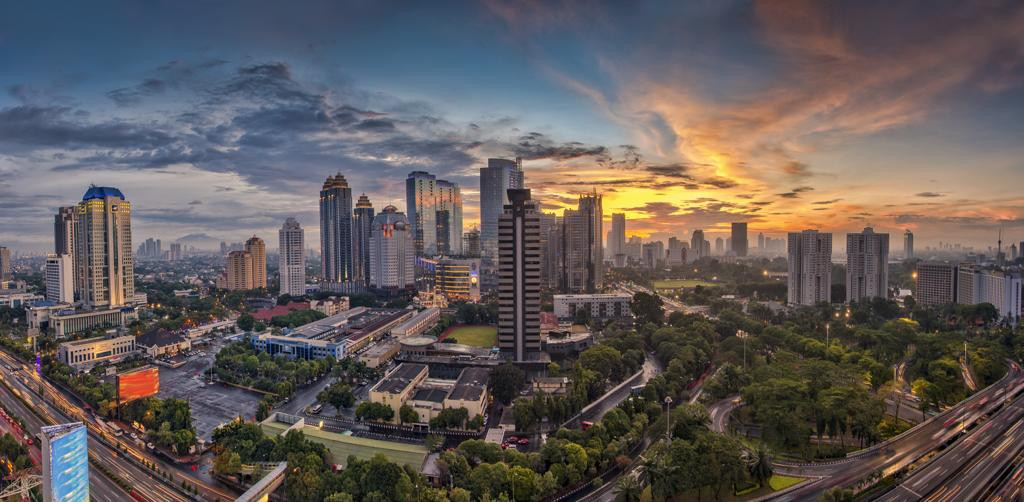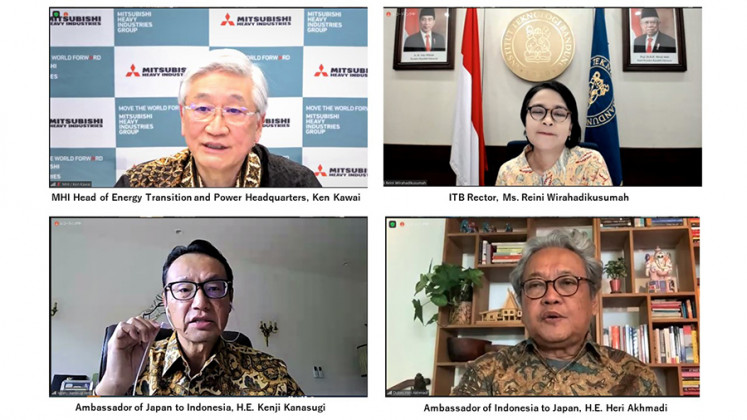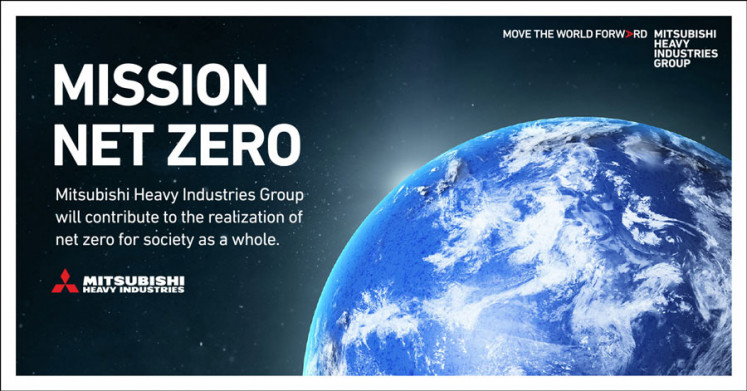Popular Reads
Top Results
Can't find what you're looking for?
View all search resultsPopular Reads
Top Results
Can't find what you're looking for?
View all search resultsPartnerships lead Mitsubishi Heavy Industries' drive toward a fair energy transition
Whether reading the news or stepping outside our front doors, the climate crisis has changed from an abstract theory to a grim reality for many of us this summer.
Change text size
Gift Premium Articles
to Anyone
W
hether reading the news or stepping outside our front doors, the climate crisis has changed from an abstract theory to a grim reality for many of us this summer. And the facts bear out our experience.
According to a report from the World Meteorological Organization (WMO), the four key climate change indicators of greenhouse gas (GHG) concentration, sea level rise, ocean heat and ocean acidification reached record highs in 2021, with average global temperatures already 1.1 degrees Celsius above pre-industrial levels. Moreover, the past seven years have been the warmest on record.
As the world’s eighth-largest GHG emitter with emissions growing in parallel with the economy, Indonesia has its part to play in the fight against global warming. On a per capita basis, however, it ranks just 113th in the WMO report, and the government rightly wishes to prioritize national development and improving income levels for the world’s fourth most populated country.
This paradox calls for a fair energy transition that answers to the needs of the people and the economy, as well as the environment.
Paving the way to a fair energy transition requires careful strategic planning that includes developing specific road maps for priority sectors. It should also involve multiple sectors and stakeholders, which could pose political and diplomatic challenges.
In July 2021, Indonesia submitted its Long-Term Strategy for Low Carbon and Climate Resilience (LTS-LCCR) 2050 to the United Nations Framework Convention on Climate Change (UNFCCC). The LTS-LCCR outlines the country’s pathways for decarbonizing its power sector while balancing its social and economic interests.
However, Indonesia’s power sector remains heavily reliant on coal, with the mining industry in some regions contributing up to 60 percent of gross regional domestic product (GRDP). Meanwhile, electricity demand is increasing as the country moves toward achieving 100 percent electrification for its growing population. Technologies that promote the adoption of cleaner, alternative fuels like ammonia and biomass in existing coal-fired power plants, as well as carbon capture, utilization and storage solutions, are needed to help reduce this dependency.
Among the strategies required for the energy transition are technology transfers and multi-stakeholder public-private partnerships. Global forums like climate conferences and multinational summits could provide platforms for such cooperation to thrive.
Indonesia holds this year’s presidency of the Group of 20, a strategic multilateral platform connecting 20 of the world's developed and emerging economies. The group’s upcoming Business 20 (B20) Indonesia forum seeks to accelerate a just and orderly transition to sustainable energy while ensuring a reliable supply chain. B20 Indonesia’s Energy Sustainability and Climate Task Force (ESC TF) brings together industry leaders with state-of-the-art technology as well as their experience in localized solutions.
The President and CEO of Mitsubishi Heavy Industries (MHI) Group, Seiji Izumisawa, is a cochair of the ESC TF. MHI believes there is no one-size-fits-all approach to carbon neutrality, and that it is important to ensure a stable, realistic and incremental approach for each country and community.
MHI is an industry leader in developing solutions to help achieve carbon neutrality, and has partnered with various governments and state institutions. In June, MHI began a feasibility study on using ammonia to fuel thermal power plants in Indonesia through its power solutions brand, Mitsubishi Power.
The study will examine the feasibility of using ammonia derived from oil and gas produced in Indonesia. The ammonia will then be combusted to generate electricity at the Suralaya coal-fired power station in Cilegon, Banten, and an existing natural gas power plant.
State electricity company PLN has an ambitious plan to develop clean energy sources to achieve 23 percent of the national energy mix by 2025. In a joint project with MHI and the Bandung Institute of Technology Bandung (ITB), PLN is exploring the potential for cofiring biomass, a low-carbon and renewable fuel source, in thermal power plants to reduce carbon emissions.
The plan proposes using wood pellets and other abundantly available low-cost materials as biomass. Aside from their stable procurement potential, the materials were selected based on existing facilities and economic considerations.
MHI is also currently exploring the potential of producing blue ammonia in Indonesia by leveraging its proprietary CO2 capture technology, which can capture between 85 and 95 percent of CO2 from ammonia plants.
“MHI is working to build consensus among governments, energy providers and other key players, strengthening existing partnerships and forming new ones.
“It is only by collaboration that this region can obtain the social, economic and environmental changes needed to advance its communities for generations to come,” said Osamu Ono, MHI senior vice president and chief regional officer, Asia Pacific & India.
MHI has set bold targets to achieve carbon neutrality by 2040In 2021, the group announced its Mission Net Zero commitment to achieve carbon neutrality by 2040. MHI aims to decarbonize its business activities and its customers’ use of MHI products and services.
As a technology leader with a proven track record in decarbonization, this commitment will help MHI realize a carbon neutral future, improve quality of life and ensure a safer world.
Learn more about MHI's perspective on the region’s path to carbon neutrality at https://spectra.mhi.com/decarbonizing-asia-pacific-three-ways-to-achieving-clean-and-reliable-power.












